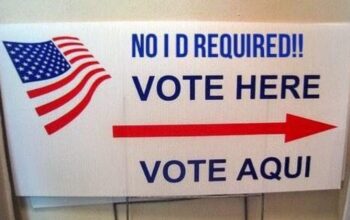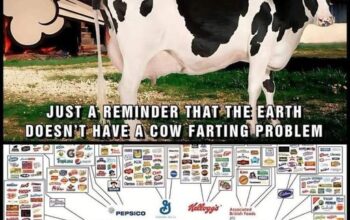Joe Biden has decided to support the Gavin Newsom effort to close down the supply chain in America. By ending diesel trucks and trains, the cost of goods and products, including food, will skyrocket. And, since we do not have enough electricity for our current needs, this guarantees blackouts and shutdowns.
“The issue dates back to April 2023 when the California Air Resources Board (CARB), the state’s lead environmental regulator, passed a first-of-its-kind rule requiring rail operators to begin transitioning their freight train fleets in the state to zero-emissions technology. CARB chair Liane Randolph said at the time that the rule is part of the California’s plan to decarbonize its entire transportation sector.
Under CARB’s rule, beginning in 2030, all locomotive engines older than 23 years will be banned on a rolling basis. In addition, the rule requires all new switch, industrial, and passenger locomotives to be zero emissions that same year while requiring new freight line haul to be zero emissions by 2035.
In November, after CARB formally requested that EPA grant it a waiver under the Clean Air Act to implement the locomotive rule, EPA finalized regulations opening the door for individual states to regulate certain locomotives and engines. And, in February, the agency initiated a public comment period related to CARB’s specific waiver request.”
If implemented, we will wish for the days of 9% inflation. Our nation will be as poverty stricken as any Third World country.
Biden’s EPA May Soon Greenlight California Diesel Train Ban, Sparking Backlash From GOP
Association of American Railroads has warned that California is using ‘unreasonable, flawed assumptions’ in its crackdown
Thomas Catenacci, Washington Free Beacon, 5/15/24 https://freebeacon.com/biden-administration/bidens-epa-may-soon-greenlight-california-diesel-train-ban-sparking-backlash-from-gop/
A coalition of 74 House lawmakers is raising the alarm on an Environmental Protection Agency move to potentially greenlight California’s ban on diesel-powered locomotives, which the lawmakers say could derail the U.S. supply chain, according to a letter first obtained by the Washington Free Beacon.
The lawmakers, led by Rep. Jay Obernolte (R., Calif.), are calling on EPA officials to “fully consider” the potential wide-ranging supply chain, technological, and environmental impacts of allowing California to move forward with its climate-related mandate. Citing industry data, the letter states that it would be impossible for freight train operators to comply with the mandate and send shockwaves throughout the U.S. supply chain.
“The freight rail sector is vital to the overall health of the economy, and changes to the regulatory landscape such as those being considered here should be approached thoughtfully,” Obernolte and the other lawmakers wrote to EPA assistant administrator Joseph Goffman. “As EPA determines whether to authorize this regulation, it is imperative that the environmental, technological, and supply chain ramifications are fully considered.”
They further urged the EPA against “ceding regulatory authority” on the issue to California.
The letter was signed by 73 Republicans and 1 Democrat, Rep. Henry Cuellar of Texas.
The issue dates back to April 2023 when the California Air Resources Board (CARB), the state’s lead environmental regulator, passed a first-of-its-kind rule requiring rail operators to begin transitioning their freight train fleets in the state to zero-emissions technology. CARB chair Liane Randolph said at the time that the rule is part of the California’s plan to decarbonize its entire transportation sector.
Under CARB’s rule, beginning in 2030, all locomotive engines older than 23 years will be banned on a rolling basis. In addition, the rule requires all new switch, industrial, and passenger locomotives to be zero emissions that same year while requiring new freight line haul to be zero emissions by 2035.
In November, after CARB formally requested that EPA grant it a waiver under the Clean Air Act to implement the locomotive rule, EPA finalized regulations opening the door for individual states to regulate certain locomotives and engines. And, in February, the agency initiated a public comment period related to CARB’s specific waiver request.
“Railroads continue to invest billions to reduce their environmental impact, a major reason why carriers contribute less than one percent of all U.S. greenhouse gas emissions,” Ian Jefferies, the president and CEO of the Association of American Railroads (AAR), recently said. “Yet California insists on using unreasonable, flawed assumptions to support a rule that will not result in emissions reductions.”
According to AAR, there is currently no path for rail operators to achieve zero emissions. The group recently wrote in comments filed with the Department of Energy that an electric locomotive would need a battery capacity of 80-100 megawatt hours to fully replace a diesel engine. The largest batteries constructed in the U.S., however, have a maximum capacity of around 10 megawatt hours.
While rail accounts for roughly 40 percent of domestic long-distance freight volume—and haul 1.6 billion tons of raw materials and finished goods every year—freight locomotives emit less than 2 percent of the nation’s total transportation-related greenhouse gas emissions, AAR data showed.
Obernolte and the other lawmakers wrote in their letter that, if EPA approves CARB’s requested Clean Air Act waiver, freight may shift to heavy-duty trucking, which has a significantly larger carbon footprint than rail.
In addition to the lawmakers and AAR, various labor unions, agriculture industry groups, the U.S. Chamber of Commerce, the National Association of Manufacturers, various rail associations like the Rail Customer Coalition and Intermodal Association of North America, defense industry groups, and leaders from a wide range of states have also expressed opposition to the EPA waiver.
The Office of Advocacy within President Joe Biden’s own Small Business Administration even wrote to the EPA late last month, warning that California’s regulations would “disproportionately impact small businesses in the locomotive sector” as well as small businesses that depend on the locomotive sector.
“Advocacy requests the EPA withhold authorization of California’s proposed In-Use Locomotive regulation until the state addresses its potential impacts on small businesses,” the agency wrote to EPA. “The ability of other states to adopt the proposed rule as well as the interdependence of multiple industrial sectors on the nation’s rail system warrant the EPA directing California to thoroughly consider the small business impacts of the In-Use Locomotive Rule.”
Obernolte, meanwhile, is temporarily joining the House Energy and Commerce Committee for a hearing Wednesday to question EPA administrator Michael Regan about CARB’s waiver request.
EPA didn’t respond to a request for comment from the Free Beacon.



